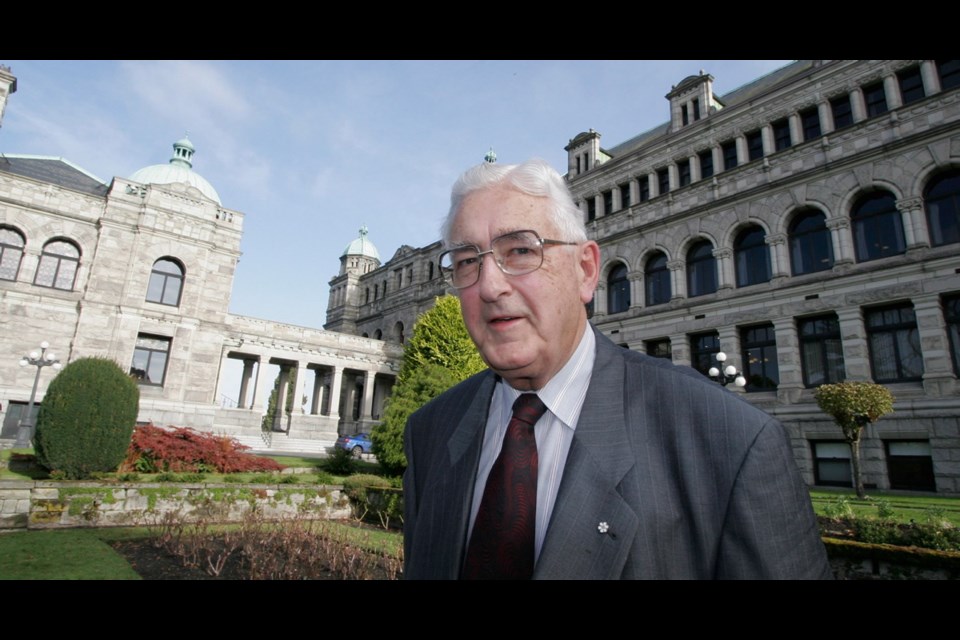Ted Hughes, B.C.’s first conflict-of-interest commissioner, whose report led to the resignation of Bill Vander Zalm as premier, died Friday in Victoria at the age of 92.
A former Saskatchewan lawyer and judge, Hughes moved to Vancouver Island in 1980, after he was passed over for Saskatchewan’s chief justice position in a move he viewed as political.
“Ted, being the man of principle he was, decided that was enough, so he came to B.C.,” said Bob Plecas, a former provincial deputy minister who knew Hughes for three decades.
In Victoria, Hughes transitioned to a career as a civil servant. He was appointed legal adviser to the provincial attorney general and three years later, became deputy attorney general.
Hughes set the standards on conflict of interest when he took on the commissioner role in 1990, a position he held for seven years.
Hughes investigated Vander Zalm’s sale of his family’s Fantasy Gardens theme park and found that the premier had mixed private business with his public responsibilities, violating conflict-of-interest rules. Vander Zalm resigned following the release of Hughes’s report.
Craig McInnes, who chronicled the civil servant’s life in the book The Mighty Hughes, said Hughes set a high bar for elected officials. “He argued for integrity in the public service and demanded it of himself and his colleagues.”
Hughes also led an overhaul of B.C.’s child-welfare system and served as chief adjudicator for a dispute resolution process involving survivors of Canada’s residential school system.
“What an incredible impact he has had on B.C. and, indeed, on Canada,” Plecas said, adding Hughes was seen as “one of the most unbiased, honest, straightforward people,” with a strong moral compass.
He cared deeply about protecting the public service and could be counted on to provide the truth, Plecas said.
Saanich Coun. Susan Brice has known Hughes since 1988 when they worked together on a report reviewing B.C.’s justice system.
They and others involved in the report travelled around the province talking to British Columbians about the justice system. They stayed in modest hotels and ordered in sandwiches for meals, which reflected Hughes’s down-to-earth nature, Brice said.
“He is highly recognized as absolutely one of the foremost individuals in Canada in the last 25 or 30 years in terms of setting public policy through thorough review of important issues,” she said.
Hughes has been recognized many times for his professional achievements. He was awarded the Order of Canada for his service to the province and the country, and has received honorary degrees from the University of Saskatchewan and the University of Victoria.
Hughes was also recognized for his service locally.
Hughes and his wife, Helen, were heavily involved in service organizations in Greater Victoria, giving their time and dollars to issues such as ending homelessness. Hughes was the first co-chair of the Greater Victoria Coalition to End Homelessness, a group that brings together voices to address the needs of a vulnerable population.
Cool Aid’s Alan Rycroft said the couple were involved with the organization both as generous donors and directly in fundraising campaign work for more than 15 years.
“They’ve given so much of themselves,” Rycroft said, calling the couple role models for the community.
Hughes was born on June 12, 1927, in Saskatoon. He died at Royal Jubilee Hospital on Friday after a short illness.
He leaves behind his wife, three sons and eight grandchildren. The family is planning a service to be held at St. John the Divine Anglican Church.



